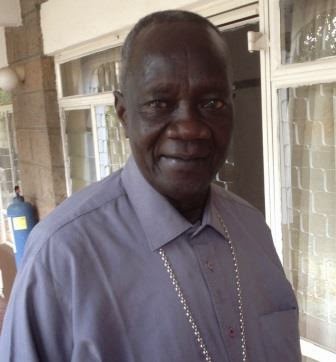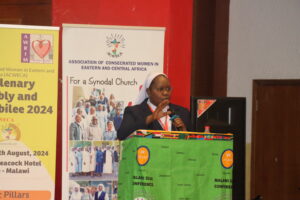South Sudan: Bishop of Wau says not all is Lost for Peace to Prevail

Since the
Conflict broke out in South Sudan in December, 2013, a mention of the youngest
Nation in the world paints a picture of hopelessness and of a country that
seems to be destined to doom. Moreover the recent collapse of negotiations for final
peace agreement between the two factions of the SPLM (Sudan People’s Liberation
Movement, the ruling party), led by President Salva Kiir and former Vice President
Riek Machar in Addis Ababa Ethiopia portray more desolate situation.
Conflict broke out in South Sudan in December, 2013, a mention of the youngest
Nation in the world paints a picture of hopelessness and of a country that
seems to be destined to doom. Moreover the recent collapse of negotiations for final
peace agreement between the two factions of the SPLM (Sudan People’s Liberation
Movement, the ruling party), led by President Salva Kiir and former Vice President
Riek Machar in Addis Ababa Ethiopia portray more desolate situation.
 |
| Bishop Rudolf Deng Majak of Wau |
Bishop
Rudolf Deng Majak, of Wau Diocese, however, expresses hope for peace and
prosperity for South Sudan. He describes the current crisis as the teething
problems of a young nation; something that will soon be forgotten.
Rudolf Deng Majak, of Wau Diocese, however, expresses hope for peace and
prosperity for South Sudan. He describes the current crisis as the teething
problems of a young nation; something that will soon be forgotten.
“Wau
compared to Malakal and other parts of South Sudan is quiet in the sense that
the fighting is not there and so does many other parts of South Sudan. But of
course people are concerned because those who are dying in other parts of the
country are all our brothers and sisters. Nobody is happy if their neighbor is
in distress,” he said.
compared to Malakal and other parts of South Sudan is quiet in the sense that
the fighting is not there and so does many other parts of South Sudan. But of
course people are concerned because those who are dying in other parts of the
country are all our brothers and sisters. Nobody is happy if their neighbor is
in distress,” he said.
“Life is
going on in South Sudan despite the gloomy situation. People are coming
together; going to work to make ends meet, to find food for their families,
children and for themselves and people are moving beyond their family circle,
beyond their ethnic communities,” he explained.
going on in South Sudan despite the gloomy situation. People are coming
together; going to work to make ends meet, to find food for their families,
children and for themselves and people are moving beyond their family circle,
beyond their ethnic communities,” he explained.
The Bishop
is positive that with good political will the present difficulties the country
is facing right will be over. “Nobody thrives and lives on war and brokenness,
but we all thrive on goodwill and the cooperation and working together to
produce more services, and send more children to school.”
is positive that with good political will the present difficulties the country
is facing right will be over. “Nobody thrives and lives on war and brokenness,
but we all thrive on goodwill and the cooperation and working together to
produce more services, and send more children to school.”
Bishop Deng
said that the voice of hope is little by little filtering into the hearts and
minds of many South Sudanese who are beginning to realize that war is not an
ending in itself, but it only brings destruction. “People have come to see the
reality that peace and reconciliation, honesty, integrity and forgiveness
brings more growth, more services, and more commitment to the common good,” he
said.
said that the voice of hope is little by little filtering into the hearts and
minds of many South Sudanese who are beginning to realize that war is not an
ending in itself, but it only brings destruction. “People have come to see the
reality that peace and reconciliation, honesty, integrity and forgiveness
brings more growth, more services, and more commitment to the common good,” he
said.
Meanwhile the
Bishop said that Christianity has tremendously grown in the Diocese of Wau, a
sign that many good things are destined to happen. He said that the Diocese is
the Mother Diocese of South Sudan and has a population of approximately five
million out of which 75% are Catholics. Bishop Deng is the eighth Bishop of Wau
and the fourth local native Bishop of the Diocese.
Bishop said that Christianity has tremendously grown in the Diocese of Wau, a
sign that many good things are destined to happen. He said that the Diocese is
the Mother Diocese of South Sudan and has a population of approximately five
million out of which 75% are Catholics. Bishop Deng is the eighth Bishop of Wau
and the fourth local native Bishop of the Diocese.
“As a Church
in a very young unstable nation we are experiencing lots of challenges. We
worry every day how to maintain and support the huge Christian population while
we are understaffed. We have vocations to the priesthood and religious life, but
many young men and women do not persevere for one reason or another. However, we
know that there is no known local Church that has grown to what it is now that
has not passed through what we are going through,” he said.
in a very young unstable nation we are experiencing lots of challenges. We
worry every day how to maintain and support the huge Christian population while
we are understaffed. We have vocations to the priesthood and religious life, but
many young men and women do not persevere for one reason or another. However, we
know that there is no known local Church that has grown to what it is now that
has not passed through what we are going through,” he said.
Bishop went
on to say that the sad situation is that many people in the community consider
themselves tribesmen and tribes women before consider themselves Christians,
Catholics, or South Sudanese. As a Church, “we have a long way to go to build
unity and diversity through pastoral projects and catechesis through holistic
approach”.
on to say that the sad situation is that many people in the community consider
themselves tribesmen and tribes women before consider themselves Christians,
Catholics, or South Sudanese. As a Church, “we have a long way to go to build
unity and diversity through pastoral projects and catechesis through holistic
approach”.
By Pamela Adinda, AMECEA Online News


